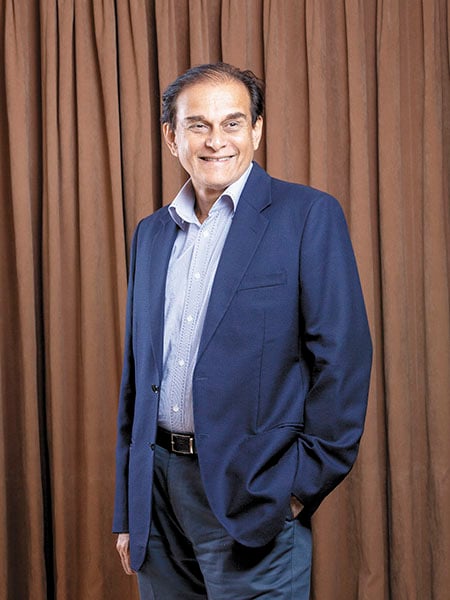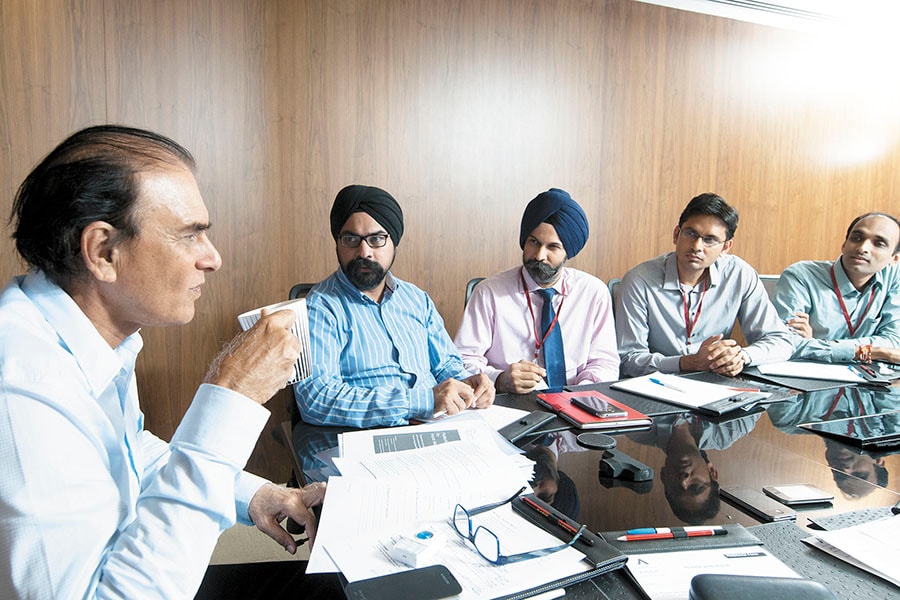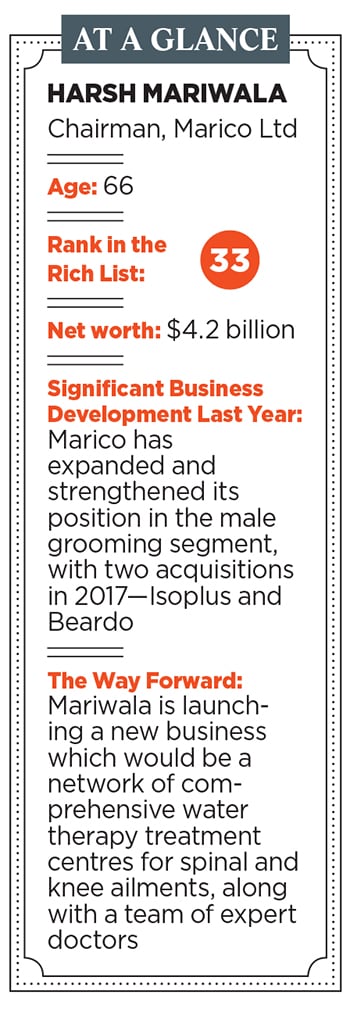Harsh Mariwala: Marico's master mentor
It's been three years since Harsh Mariwala engineered a seamless transfer of executive responsibilities to professionals at FMCG giant Marico. But make no mistake, the inquisitive entrepreneur is far


 Harsh Mariwala has found time to pursue goals beyond professional work, particularly in giving back to society in a stronger way than in previous decades
Harsh Mariwala has found time to pursue goals beyond professional work, particularly in giving back to society in a stronger way than in previous decades
Image: Prasad GoriOne would think that in the constantly variable world of retail consumption, where products on demand can fly off shelves in the twinkling of an eye, the promoter of a fast-moving consumer goods (FMCG) company of considerable repute and size might also be constantly on the edge, surrounded by MIS reports and product presentations.
Yet, there is an air of calmness when one steps into the chamber of Harsh Mariwala, the founder of the ₹40,000-crore (by market capitalisation as on October 11) Marico, whose flagship Parachute hair oil and Saffola cooking oil brands touch the lives of one out of three Indians.
A few folders lie on a pristine long table, set against several wall shelves and a desktop computer, in his office at Mumbai’s bustling business district of Bandra-Kurla Complex. It’s been over three years since Mariwala, 66, decided to take his foot off the pedal (he pulled out of executive responsibilities, stepping down as managing director of Marico in 2014). But he has not lost his mojo despite battling rivals—Hindustan Unilever (HUL), Godrej Consumer Products Ltd (GCPL), Dabur India and Emami Ltd—for over 20 years and expanding business operations to 25 countries across Africa and Asia.
Do not also be deceived into thinking that Mariwala—ranked 33rd on the 2017 Forbes India Rich List with a net worth of $4.2 billion (around ₹27,000 crore)—has hung up his boots. He serves as chairman on the board of Marico, is on the cusp of launching a new venture and has found time to pursue goals beyond professional work, particularly in giving back to society in a stronger way than in previous decades.Each day of his is well -chalked-out: From the review meetings of the initiatives he is involved with—Marico, Kaya Ltd, Marico CSR, Marico Innovation Foundation, Ascent, Mariwala Health Initiative and the family office—to his daily workouts at the gym and golf over the weekends.
Mariwala could not have timed the transition at Marico better. The key businesses (barring the skin care services business Kaya) were in sound financial health, the board, audit committee and the mentoring of the top management were operating like well-oiled machines and his two children, Rishabh and Rajvi, had found strength in their respective professional spaces.
There is a real assurance that Marico—set up by Mariwala in 1990 after breaking away from the family-owned Bombay Oil Industries Ltd—has transitioned seamlessly to a professionally-managed company from a family-led commodity business. In ensuring the change, Mariwala would owe some credit to a Marico faithful and now CEO, Saugata Gupta, who joined the company in 2004 and has been firmly holding the reins of the day–to-day business in a competitive environment.
Personally, though, the shift was not easy for Mariwala. “Suddenly I went from [working] full time to about 30 percent I had to do new things and reinvent myself,” he tells Forbes India. “I took about six to 12 months to prepare to step back… Saugata had to be mentored and we had to tell the board. I always believed the interests of the organisation came before the individual, so I was ready to go,” says Mariwala.
The process of handing over the baton was methodical. Mariwala codified both his and Gupta’s roles in the new scheme of things. “Saugata and I wrote down what we thought our roles should be and then we compared notes before presenting it to the board,” recalls Mariwala.
At a time when friction between founder-promoters of many companies (read Infosys and the Tata group) and their board of directors has come under criticism, Marico’s case stands apart. Mariwala has found the right balance of dealing with the board, the CEO and his team.
These days he prefers to talk less about Marico and more about macroeconomics and building institutions. We throw a query regarding the strategy for a Marico product, for instance, and Mariwala steers the conversation towards other critical issues—“How does one transition from an active role and hand over the reins to professionals?”
On that, Mariwala does some straight talking. “I look at Infosys… if they [the founders] had some alignment with the board of directors and decided on the values that had to be incorporated, things may have been different. If there is an unclear alignment [between the founders and the board]—or even if there are no problems—it is best to sit down and decide on issues, rather than go public,” he says.
“I have shed some responsibilities but not abdicated them. Saugata is more accountable but I am also accountable. Each one of us has different ways of seeing how the company is faring,” he says. “My mind is always on, but my hands are off.” This is clear from the fact that Mariwala usually has a brief chat with Gupta every day, but there is no obsession to track daily sales charts.
Mariwala shows us a register, which explicitly outlines his role as chairman. A quick read of this reveals:
&bull Strategic business planning: [Provide] visionary and strategic inputs to the top team for the process of creation of business strategy critique of the business strategy created by the business, focus on new category entry, new brands and extensions, etc.
&bull Leadership development: Mentor the MD and CEO.
&bull Acquisitions and divestments: Review and guide initiatives.
&bull Strengthen Marico’s board: Creation of a board agenda and anchoring the business strategy, risk reviews and internal governance.
&bull Crisis management: Resolve critical issues during a crisis.
Explains Gupta: “The process of transition probably started in 2012-13. We had a comfort level. I was at that time in my ninth year at Marico and came up with our ‘roles’ paper. This ensured that there were no grey areas. The journey has been evolutionary rather than revolutionary.”
The growth of Marico to an FMCG giant from a business dependent on commodity prices in the form of copra (for Parachute coconut oil) and safflower seeds (for Saffola oil) between 1990 and 2000 has also been evolutionary.  Each month, Mariwala (extreme left) meets a set of new entrepreneurs, where they discuss challenges and assess outcomes
Each month, Mariwala (extreme left) meets a set of new entrepreneurs, where they discuss challenges and assess outcomes
Image: Mexy Xavier
In the course of its journey, Marico has picked up brands (it bought the Paras personal care brands Set Wet, Livon and Zatak from Reckitt Benckiser in 2016 and also the Nihar hair care brands from HUL in 2006) and also recently acquired companies in the male grooming space (Zed Lifestyle and Isoplus) where—despite the presence of international brands—market penetration is still in single digits.
Marico has also expanded its presence to international markets, including the Middle East, Vietnam, Malaysia and Bangladesh. Mariwala explains some of the learnings while expanding overseas. “It is difficult normally there is the temptation to hand over operations to an Indian distributor but you need to have a separate dedicated resource to evaluate consumer behaviour and trends—each territory has a different culture.” There are also learnings in terms of product portfolio in each territory. When Marico expanded operations to Egypt—a market with a strong focus on costs—it applied some of the cost focus to Indian operations.
And large shareholders are happy with how Marico has matured. Rahul Bhasin, founder and managing director of Baring Private Equity Partners India, has been a Marico investor in his personal capacity since a little after the company’s IPO in 1996. (₹100 invested at the time of the IPO was worth ₹14,150 on March 31, 2017, implying a CAGR of 27 percent.)
Bhasin recounts his first meeting with Mariwala, when the IPO was set to be launched. “I met him at a time when there was a lot of negative publicity around the company [there was apprehension as the company’s key brands Parachute and Saffola were owned by Bombay Oil Industries at the time].” But Bhasin was so impressed by his value systems that he bought into Mariwala’s verbal assurance that he would “get it done”. Bhasin bought a block of Marico shares for himself and family which he has never divested. True to Mariwala’s word, Marico acquired the Parachute and Saffola brands from Bombay Oil Industries in 1999.
“I found an inquisitive entrepreneur with an open mind. He has been among the most outstanding entrepreneurs I have seen over the past 20 years with the ability to translate innovation into relentless excellence in execution,” says Bhasin.
Bhasin candidly admits that Mariwala’s decision to step back in 2014 did get him a bit worried, “but he plays a very active and effective role as chairman”. “The company has a very explicit and strong value system. Harsh has had this hunger to keep getting better every time I chat with him, he is reflecting on a new idea,” says Bhasin.
Marico continues to follow some of the mantras that Mariwala had spelt out earlier—choose categories where the company believes it has a ‘right to win’ (where it has already won market leadership and is expanding), do not enter segments which are highly penetrated (such as soaps) and rebrand or carry out brand extensions where possible (Saffola oats, Saffola multigrain flakes) in the form of in-between meals and breakfast foods.
CEO Gupta is confident that there is room for growth even with already well-established brands: For instance, the company hopes to expand Parachute in rural India, from where comes 42 percent of the brand’s sales with the balance in urban India. Marico, which this year made two acquisitions in the male grooming space—a 45 percent stake in Beardo’s parent firm Zed Lifestyle and hair styling brand Isoplus—is confident that this segment will witness strong growth in the coming years.
*********
Marico’s business and its CSR activity take up over a quarter of Mariwala’s time, he says. He also devotes equal time to the skin care business Kaya. Over 15 years after opening the first Kaya Skin Care clinic in Mumbai and listing it as a separate company, the business reveals loose ends which have yet to be dealt with.
In 2014, Kaya Ltd merged with its parent Marico Kaya Enterprises Ltd (MaKE), with the former being listed separately.
undefinedMariwala has found the right balance of dealing with the board, the CEO and his team[/bq]
Kaya Ltd reported a net loss of ₹8.62 crore in FY16 and ₹17.76 crore in FY17. There are 101 Kaya skin clinics in India, 23 in the Middle East and 137 Kaya Skin Bars.
The focus of Kaya’s India business would be to drive specialised doctor-led services such as anti-ageing, fairness-pigmentation and hair care. For the Saudi Arabia business, the focus for the next year would be to improve the business and to bring it back to single-digit growth. “We have an internal challenge for Kaya in India there are both leadership and execution issues,” says Mariwala.
He says ensuring that talent does not leave remains a key concern. “We have to improve customer service, offer something that investors want, invest more in technology and sell more products. I have confidence that it will turn around but we have to do it in the next one or two years,” he adds.
A New Venture
Mariwala knows the challenges of building a business and taking decisions as an entrepreneur: After all, he took over his family business (Bombay Oil Industries) in 1971 and managed to turn it around by building brands and marketing concepts, before starting a separate company. “It [Bombay Oil Industries] was completely family-managed: No professionals, some supervisors, and a few family friends working for the family,” Mariwala had told Forbes India earlier.
After starting Marico, in the initial phase, the company relocated its corporate headquarters (from Masjid Bunder to Bandra in Mumbai), expanded manufacturing facilities and opened centres for research and development and product quality. In the next phase, came acquisitions (Nihar, Camelia, Manjal and Paras), product innovations (Safflower oil blends, oats and value-added hair oils) and attracting top talent.
Saurabh Mukherjea, the CEO of Ambit Capital who has studied Marico in his book Unusual Billionaires, says the company took steps such as advertising and promotional spends for product campaigns, keeping buffers to safeguard against unexpected costs and improved demand forecasting which helped it plan its copra purchases better.
Entrepreneurship and strategising come naturally to Mariwala. He continues to spend a significant portion of his time in entrepreneurship-related activities, whether it be at Ascent Foundation, a peer-to-peer platform which he created in 2012, or even meeting budding and new entrepreneurs separately.
Each month, Mariwala meets a set of new entrepreneurs, where they discuss challenges and carry out follow-up meetings. Mariwala also spends time with his daughter Rajvi’s venture Mariwala Health Initiative, which helps organisations play a catalytic role in solving mental health problems. He also works with the Marico Innovation Foundation, which serves as an incubator for Marico’s social aspirations, including the health foundation.
Mariwala’s son Rishabh was instrumental in advising his father to create a family office—Sharrp Ventures—in an effort to de-risk their portfolio, considering that all of Mariwala’s wealth was in the form of Marico shares. Rishabh looks at this venture besides his own Soap Opera N More, which makes ‘non-toxic’—herbal and handmade—soaps.
With much satisfaction, Mariwala suddenly says, “I am now setting up a new business.” More towards achieving a social cause, Mariwala is building ‘Aqua Centric Pvt Ltd’, a water therapy treatment centre, with Dr Amit Kohli, a renowned physiotherapist, for aiding in the recovery from spinal and knee injuries. The health care venture is set to be launched in December this year.
“It will be a comprehensive centre—with a large swimming pool, built-in treadmill, a team of specialist doctors, including paediatricians, gynaecologists, neurosurgeons and physiotherapists, to deal with back- and knee-related issues.” The first clinic will open in Andheri, Mumbai, with at least another three centres planned for the city.
At this stage of the interview, Mariwala gets a bit impatient, getting ready for a review meeting for one of the businesses. After nearly 46 years of professional life, Mariwala’s strengths could be listed—disciplined and focussed with a willingness to learn. All these played a part in building Marico as a brand.
Gupta has an eye on strengthening the new brands which Marico has acquired, for it is clear that the nature of the company’s original businesses—food and nutrition—are not evolving dramatically in India. Distribution models are, however, changing and Marico will have to deal with it.
But the new guard at Marico may not have much to worry about as Mariwala’s vision, well-outlined processes and an open-door policy of meeting investors and shareholders,will remain pillars on which the company stands.
First Published: Nov 27, 2017, 07:44
Subscribe Now